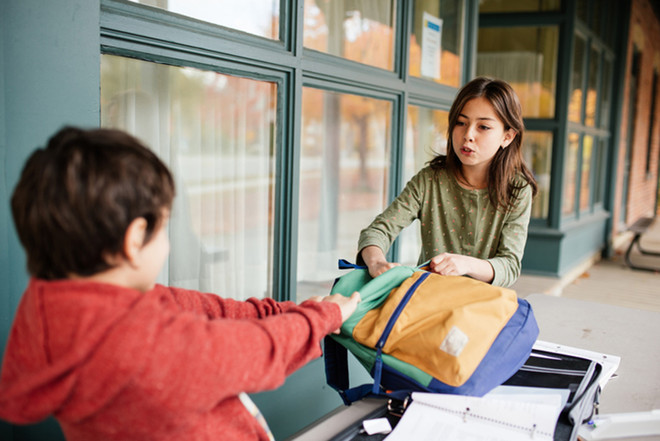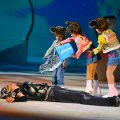Just recently we told the story of KeatonJones, who was hounded to such an extent at school, that he was even afraid to go to the dining room. The boy was shoved with bacon by the collar, poured milk over him, and threw bread. And that's not counting obzyvatelstv. Keaton, one might say, was lucky: on the video in which the boy emotionally tells that he doesn’t understand why people are so angry, celebrities reacted and. In our schools, similar incidents are also enough: forums and social networks are full of stories of outraged and frustrated parents with a situation in which they themselves can do little to help. Do not run the same truth to school or kindergarten to punish the offender. Sometimes peacekeeping conversations with a teacher, educator, bully himself or his parents do not give anything, but only aggravate the situation. So is it really time to start teaching children self-defense earlier than the alphabet? A photo: Getty Images Recently, in one of the anonymous communities where users share their stories, there appeared such a plot from a worried father: “One day, a daughter came from school and told that in the morning a third grader was molested by her — throwing her briefcase and calling names. Well, I think, children's disassembly, why go there. But the situation began to deteriorate, and this boy began to beat my daughter and other girls who came earlier. This is very convenient: there are no teachers in the school yet, but the guard, although a very good person, could not do anything except comments. I talked to our teacher, who spoke to the boy’s teacher, but this caused a new round of aggression focused on my daughter. I went to the director, but she replied that she sympathizes with me, but the only thing she can do is to prohibit children from being allowed to go to school before the arrival of teachers. ”The hooligan continued to terrorize children with impunity. When it was not possible to resolve the issue in an adult manner, the man taught his daughter to defend himself and was pleased with the result. Parental pride and came through in the detailed description of the blood fountain, gushing due to the efforts of his offspring from the bully nose ... The author said that after such a rebuff, the boy's parents rushed to disassemble. But the victims in one voice said that he himself was to blame. More such stories did not repeat. But my father finally admitted that he was not proud of his act, but he didn’t regret what he had done. Someone thought the story instructive, someone cruel. The mother of four children from Rostov-on-Don, Olga Sidorova-Sherstobitova, has repeatedly encountered similar situations. At the same time, the “wall to wall” method does not approve, since I am sure that it is always possible to agree and understand why this or that situation arose: “I often went to kindergarten. But at school, she tried to interfere in the relationships of children less. One of the daughters, a fourth-grader, recently got into an interesting situation. For some reason, a friend bit her in the shoulder, so much so that she hit into a scream. So they roared together, one from pain, the other from resentment. And yet with girls easier. It is easier for them to explain why it is worth more to emphasize words than acts By the way, our dad insists all the time that we need to be able to give change, and it is not easy to persuade him. ”This, as it turned out, is a fairly common situation - it is fathers who appear in most of these stories. Men, after all, are themselves a hot people; it’s much more common for them to clear up the relationship with their fists. According to the teacher-psychologist Victoria Arkhipova, this is due to gender differences. At the same time, such a behavioral scheme applies primarily to full families with two parents.
A photo: Getty Images Recently, in one of the anonymous communities where users share their stories, there appeared such a plot from a worried father: “One day, a daughter came from school and told that in the morning a third grader was molested by her — throwing her briefcase and calling names. Well, I think, children's disassembly, why go there. But the situation began to deteriorate, and this boy began to beat my daughter and other girls who came earlier. This is very convenient: there are no teachers in the school yet, but the guard, although a very good person, could not do anything except comments. I talked to our teacher, who spoke to the boy’s teacher, but this caused a new round of aggression focused on my daughter. I went to the director, but she replied that she sympathizes with me, but the only thing she can do is to prohibit children from being allowed to go to school before the arrival of teachers. ”The hooligan continued to terrorize children with impunity. When it was not possible to resolve the issue in an adult manner, the man taught his daughter to defend himself and was pleased with the result. Parental pride and came through in the detailed description of the blood fountain, gushing due to the efforts of his offspring from the bully nose ... The author said that after such a rebuff, the boy's parents rushed to disassemble. But the victims in one voice said that he himself was to blame. More such stories did not repeat. But my father finally admitted that he was not proud of his act, but he didn’t regret what he had done. Someone thought the story instructive, someone cruel. The mother of four children from Rostov-on-Don, Olga Sidorova-Sherstobitova, has repeatedly encountered similar situations. At the same time, the “wall to wall” method does not approve, since I am sure that it is always possible to agree and understand why this or that situation arose: “I often went to kindergarten. But at school, she tried to interfere in the relationships of children less. One of the daughters, a fourth-grader, recently got into an interesting situation. For some reason, a friend bit her in the shoulder, so much so that she hit into a scream. So they roared together, one from pain, the other from resentment. And yet with girls easier. It is easier for them to explain why it is worth more to emphasize words than acts By the way, our dad insists all the time that we need to be able to give change, and it is not easy to persuade him. ”This, as it turned out, is a fairly common situation - it is fathers who appear in most of these stories. Men, after all, are themselves a hot people; it’s much more common for them to clear up the relationship with their fists. According to the teacher-psychologist Victoria Arkhipova, this is due to gender differences. At the same time, such a behavioral scheme applies primarily to full families with two parents. Photo:Getty Images“There is no clear answer to the question of whether a child should be taught to fight back,” Victoria believes. “Let’s look at the problem from the perspective of expressing aggression. Let’s start with preschoolers. Children aged 2–4 are actively socialized, which leads to clashes. Remember, each conflict is individual and should never be grouped into certain categories. On the contrary, you should always understand the reasons and look at the situation from several angles. Since children do not know many moral aspects, it is useless to explain to a child that this is good or bad; with their little fists, they defend their right to be in this group. The task of adults is to resolve these conflicts.” As for schoolchildren, it is important to teach both boys and girls a few simple principles: respect yourself and your body; if a conflict can be avoided, it is better to do so; if there is no such possibility, then you can fight back, but in such a way as not to cause serious injury to the offender. The psychologist includes the last point in the list for a reason. It is important to remember that children do not have perfect self-control, do not know the consequences that a blow can lead to. In addition, it is important to convey all this to the child in an accessible way, so that the confrontation with the offender does not develop into open aggression directed against weaker children. It turns out that in a child it is necessary to simultaneously raise both a personality and a fighter? But this is always a double-edged sword: on the one hand, a modest, overly well-mannered or simply constrained schoolchild will not hit his peer, and even more so someone who is younger. On the other hand, these days, neither one nor the other is likely to do without at least self-defense skills - this will be useful to them both at a very young age and in high school. The final decision always remains with the parents, experts advise them to send their children to sports sections - this is both an interesting hobby and an opportunity to learn to stand up for themselves. What to do here, the decision is up to mom and dad. However, in any team there are so-called difficult children. And competent, responsible teachers should initially single them out for themselves, find a special approach to them and work not only with them, but also with their parents. And preferably long before their antisocial behavior harms someone. And what do you think, should children be taught to fight back? Write your opinion in the comments!
Photo:Getty Images“There is no clear answer to the question of whether a child should be taught to fight back,” Victoria believes. “Let’s look at the problem from the perspective of expressing aggression. Let’s start with preschoolers. Children aged 2–4 are actively socialized, which leads to clashes. Remember, each conflict is individual and should never be grouped into certain categories. On the contrary, you should always understand the reasons and look at the situation from several angles. Since children do not know many moral aspects, it is useless to explain to a child that this is good or bad; with their little fists, they defend their right to be in this group. The task of adults is to resolve these conflicts.” As for schoolchildren, it is important to teach both boys and girls a few simple principles: respect yourself and your body; if a conflict can be avoided, it is better to do so; if there is no such possibility, then you can fight back, but in such a way as not to cause serious injury to the offender. The psychologist includes the last point in the list for a reason. It is important to remember that children do not have perfect self-control, do not know the consequences that a blow can lead to. In addition, it is important to convey all this to the child in an accessible way, so that the confrontation with the offender does not develop into open aggression directed against weaker children. It turns out that in a child it is necessary to simultaneously raise both a personality and a fighter? But this is always a double-edged sword: on the one hand, a modest, overly well-mannered or simply constrained schoolchild will not hit his peer, and even more so someone who is younger. On the other hand, these days, neither one nor the other is likely to do without at least self-defense skills - this will be useful to them both at a very young age and in high school. The final decision always remains with the parents, experts advise them to send their children to sports sections - this is both an interesting hobby and an opportunity to learn to stand up for themselves. What to do here, the decision is up to mom and dad. However, in any team there are so-called difficult children. And competent, responsible teachers should initially single them out for themselves, find a special approach to them and work not only with them, but also with their parents. And preferably long before their antisocial behavior harms someone. And what do you think, should children be taught to fight back? Write your opinion in the comments!

Making Money with Desserts: Success Stories
Evgeniya Polischuk (Fedutinova) instagram:@evgeniyafedutinovavk.com/janeshomebaking– It all started with baking for family and friends. Gradually, I started posting photos of my baked goods on Instagram – and orders started coming in. I made my first custom-made cake on October 13, 2014, and a little earlier I started making macaroons and cupcakes. You could say that the business “found me”, I am very […]

Soups are cold recipes with photos
Cold cucumber soup with yogurt and lemonsorbet from the chef of the restaurant La Taverna Alexander Zhurkin Photo: Getty Images Ingredients: Plain yoghurt – 125 g Cucumber – 150 g Lemon/lime sorbet – 50 g Cocktail shrimp – 24 g Fresh ginger juice – 1 g Lime juice – 5 g Fresh orange juice – 5 g Parsley – 1 g Pink pepper – 1 g Watercress – […]

barbeque kebab
Pork tenderloin in glaze Photo:Dmitry Bayrak/dbstudioPreparation time: 20 minutes + marinating time.Calories: 454 kcal per serving.For 4 servings: 4 pork tenderloins (approximately 300 g each), 1 onion, 2 cloves of garlic, 1 tsp. lemon zest, 1 tsp. lemon juice, a pinch of ground cumin, coriander and turmeric, 1 tbsp. vegetable […]

Pierre Duacan: dietary recipes: Ducane diet
Beetroot soup Photo:Season’S, Luxury Hotels RepresentationYou will need:· Boiled beetroot – 60 g· Fresh cucumbers – 20 g· Red radish – 20 g· Green onions – 10 g· Egg – 1 pc.· Drinking mineral water – 200 g· Salt – 1 gPreparation:· Boil the egg and beetroot.· Grate the cucumbers, radish and part of the beetroot. Put everything […]





